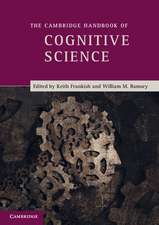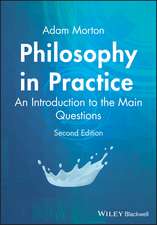Wittgenstein: Lectures, Cambridge 1930–1933: From the Notes of G. E. Moore
Editat de David G. Stern, Brian Rogers, Gabriel Citronen Limba Engleză Paperback – 23 ian 2019
| Toate formatele și edițiile | Preț | Express |
|---|---|---|
| Paperback (1) | 234.23 lei 3-5 săpt. | +52.86 lei 7-13 zile |
| Cambridge University Press – 23 ian 2019 | 234.23 lei 3-5 săpt. | +52.86 lei 7-13 zile |
| Hardback (1) | 721.30 lei 6-8 săpt. | |
| Cambridge University Press – 6 noi 2016 | 721.30 lei 6-8 săpt. |
Preț: 234.23 lei
Nou
Puncte Express: 351
Preț estimativ în valută:
44.82€ • 46.96$ • 37.05£
44.82€ • 46.96$ • 37.05£
Carte disponibilă
Livrare economică 21 martie-04 aprilie
Livrare express 07-13 martie pentru 62.85 lei
Preluare comenzi: 021 569.72.76
Specificații
ISBN-13: 9781108730198
ISBN-10: 1108730191
Pagini: 494
Ilustrații: 40 b/w illus. 30 tables
Dimensiuni: 150 x 229 x 23 mm
Greutate: 0.66 kg
Editura: Cambridge University Press
Colecția Cambridge University Press
Locul publicării:Cambridge, United Kingdom
ISBN-10: 1108730191
Pagini: 494
Ilustrații: 40 b/w illus. 30 tables
Dimensiuni: 150 x 229 x 23 mm
Greutate: 0.66 kg
Editura: Cambridge University Press
Colecția Cambridge University Press
Locul publicării:Cambridge, United Kingdom
Cuprins
Editorial introduction; Synoptic table of contents; Lectures, Cambridge, 1930–3: from the notes of G. E. Moore: Lent term, 1930; May term, 1930; Michaelmas term, 1930; Lent term, 1931; May term, 1931; May term, 1932; Michaelmas term, 1932; Lent term, 1933; May term, 1933; Appendix: Moore's short paper on Wittgenstein on grammar; Biographies; Moore's abbreviations; Bibliography; Index.
Recenzii
'The material presented in this edition is of the first importance to Wittgenstein scholarship. It helps us narrow in on early but richly developed steps in Wittgenstein's thinking on issues to do with meaning and understanding, the notion of 'grammar', rule following, notions of sense and nonsense, and the foundations of logic and mathematics … The editorial approach laid out in the rich introduction and demonstrated in the main sections of the edition seems to me to be just right, striking a balance between completeness and faithfulness, on the one hand, and readability on the other … this edition helps get us closer to hearing more fully and more directly what Wittgenstein said in his lectures from this period.' Jeff Johnson, St Catherine University, Minnesota
'As we learn more about Wittgenstein's lectures, we find that he often made points in a clearer, subtler, or more elaborate fashion in his lectures than in his own writings. It is a gift to have these full lecture notes by G. E. Moore, that allow us to judge for ourselves the points Wittgenstein made as he engaged with his students over his new thoughts.' James C. Klagge, Virginia Tech
'No one would have been better qualified than G. E. Moore was to take notes enabling him to draw a vivid picture helping today's readers to get a good grasp of what it was like to attend Wittgenstein's brilliant classes in the early 1930s. Stern, Rogers and Citron have done an extremely good job: readers will be indebted to them for a meticulous edition which succeeds in balancing scholarly needs and all reasonable requirements of readability. The book presenting these lecture notes constitutes an exceptional document which everyone interested in the development of Wittgenstein's mature thought will gratefully add to their shelves.' Joachim Schulte, Universität Zürich
'Moore's notes on Wittgenstein's lectures from 1930 to 1933 illuminate a decisive stage in the development of Wittgenstein's thought from his early to his later philosophy. We see Wittgenstein dismantling day by day the assumptions of the Tractatus and see rising from the rubble the outlines of a fresh, new philosophizing. The volume will prove indispensable to anyone who wants to track the changes in Wittgenstein's thinking. It gains substantially from the extensive editorial and explanatory notes provided by its editors.' Hans Sluga, University of California, Berkeley
'G. E. Moore's notes from Wittgenstein's 1930–1933 Cambridge lectures constitute a new and indispensable resource for students and scholars of Wittgenstein's philosophy alike. … With reference to Wittgenstein's later philosophy, one key highlight of the text under review is an Appendix containing a short paper on Wittgenstein on 'grammar', delivered to the class by Moore in February 1932. … Again, I can enthusiastically recommend the book both to students and scholars. For anyone with an interest in Wittgenstein's rich, sophisticated, and challenging philosophy, Moore's notes will prove to be a fruitful and significant, if not essential, scholarly resource.' James Connelly, Dialogue: Canadian Philosophical Review
'… [This] volume is a treasure chest. Moore's notes bring Wittgenstein's genius before us by inviting us to listen to his lectures and encounter the intensity of his thought before its brilliance has been disciplined by the carefully organised dialectic one finds in his famous works. The editors have done a tremendous job in resurrecting Moore's notes and thereby enhancing the availability of Wittgenstein's middle philosophy.' Notre Dame Philosophical Reviews
'As we learn more about Wittgenstein's lectures, we find that he often made points in a clearer, subtler, or more elaborate fashion in his lectures than in his own writings. It is a gift to have these full lecture notes by G. E. Moore, that allow us to judge for ourselves the points Wittgenstein made as he engaged with his students over his new thoughts.' James C. Klagge, Virginia Tech
'No one would have been better qualified than G. E. Moore was to take notes enabling him to draw a vivid picture helping today's readers to get a good grasp of what it was like to attend Wittgenstein's brilliant classes in the early 1930s. Stern, Rogers and Citron have done an extremely good job: readers will be indebted to them for a meticulous edition which succeeds in balancing scholarly needs and all reasonable requirements of readability. The book presenting these lecture notes constitutes an exceptional document which everyone interested in the development of Wittgenstein's mature thought will gratefully add to their shelves.' Joachim Schulte, Universität Zürich
'Moore's notes on Wittgenstein's lectures from 1930 to 1933 illuminate a decisive stage in the development of Wittgenstein's thought from his early to his later philosophy. We see Wittgenstein dismantling day by day the assumptions of the Tractatus and see rising from the rubble the outlines of a fresh, new philosophizing. The volume will prove indispensable to anyone who wants to track the changes in Wittgenstein's thinking. It gains substantially from the extensive editorial and explanatory notes provided by its editors.' Hans Sluga, University of California, Berkeley
'G. E. Moore's notes from Wittgenstein's 1930–1933 Cambridge lectures constitute a new and indispensable resource for students and scholars of Wittgenstein's philosophy alike. … With reference to Wittgenstein's later philosophy, one key highlight of the text under review is an Appendix containing a short paper on Wittgenstein on 'grammar', delivered to the class by Moore in February 1932. … Again, I can enthusiastically recommend the book both to students and scholars. For anyone with an interest in Wittgenstein's rich, sophisticated, and challenging philosophy, Moore's notes will prove to be a fruitful and significant, if not essential, scholarly resource.' James Connelly, Dialogue: Canadian Philosophical Review
'… [This] volume is a treasure chest. Moore's notes bring Wittgenstein's genius before us by inviting us to listen to his lectures and encounter the intensity of his thought before its brilliance has been disciplined by the carefully organised dialectic one finds in his famous works. The editors have done a tremendous job in resurrecting Moore's notes and thereby enhancing the availability of Wittgenstein's middle philosophy.' Notre Dame Philosophical Reviews
Descriere
This volume is an edition of G. E. Moore's notes taken at Wittgenstein's seminal Cambridge lectures in the early 1930s.
















